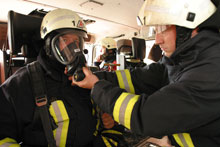
Rescue personnel, such as those in the fire brigade, are exposed to a large number of hazards during their assignments. Heat, polluted atmospheres, mechanical impacts and possibly even warfare agents make it difficult or impossible to rescue people. For some years, under the main heading of "smart personal protective equipment (PPE) or "smart clothes", functional textiles have been developed which interact actively with the wearer and/or the environment and hence count as ambient intelligence technologies. The aim is to reduce the number of incorrect decisions by providing an improved information base and to increase the use possibilities and the safety of task forces in extreme situations.
The project bundle "Decision-making relevance and behavioural effects of information on 'intelligent' protective clothing" links up with BMBF-funded research at BAuA and studies resulting changes in the organisation of rescue personnel. In a number of sub-projects it is intended to study how smart clothes actively support people's action in the actual complexity of the assignments, and also what hazards may arise from them. Of special importance here are questions of the interpretation of information, the responsibility for decision-making and acceptance. In a sub-project, for instance, a mathematical model is being developed which interprets the vital parameter of the rescue person (e.g. heartbeat frequency, oxygen saturation of the blood) and ambient parameters (heat, pollutants etc.) which processes these in a suitable form for further decisions. Where relevant smart PPE may also give rise to new risk or load factors, for example if the protective clothing suggests safety thus prompting the rescue person to behave in a careless fashion (risk compensation). A further sub-project therefore goes into how smart clothes and AmI products are handled in a social sense, and it does this by also considering aspects of data protection and personality rights.